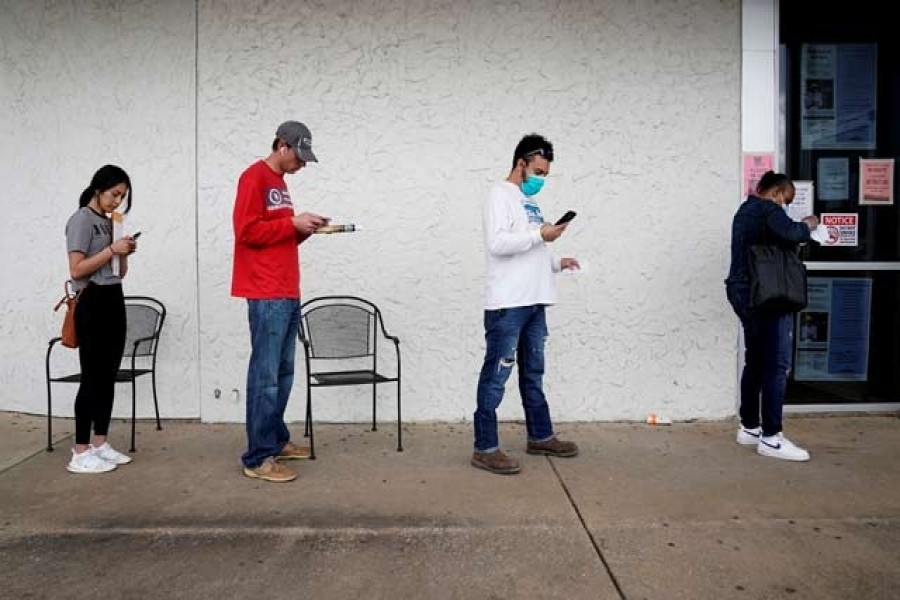As White House economic reopening guidance expired on Thursday after two weeks in place, half of all US states forged ahead with easing restrictions on restaurants, retail and other businesses in hopes of reviving coronavirus-stricken commerce.
The enormous pressure on states to reopen, despite a lack of wide-scale virus testing and other precautions urged by health experts, was highlighted in new Labour Department data showing some 30 million Americans seeking unemployment benefits since March 21.
The jobless toll amounts to more than 18.4 per cent of the US working-age population, a level not seen since the Great Depression of the 1930s.
Physical separation of people - by closing schools, businesses and other places of social gatherings - remains the chief weapon against a highly contagious respiratory virus with no vaccine and no cure.
But as economic pain grows to historic proportions, agitation to relax stay-at-home orders and mandatory workplace restrictions has mounted, especially in regions where the spread of the coronavirus appeared to be waning.
For the second time in two weeks, hundreds of protesters - including armed militia group members - thronged Michigan's state Capitol in Lansing demanding an end to Governor Gretchen Whitmer's stay-at-home orders.
The latest protest was sparked by the Democratic governor's request, ignored by Republican lawmakers, to extend emergency powers she had invoked in a state hard hit by both the virus and closures to combat it.
White House steps back
Weeks after insisting he had "total" authority to decide when and how to reopen the nation's economy, President Donald Trump has largely left it to each governor to decide on a state-by-state basis.
Although the White House declined to extend its April 16 reopening guidance, which recommended an economic restart in stages only after strict safeguards are put in place, medical experts said those conditions remained unmet and that acting prematurely risked a resurgence of the outbreak.
Safely lifting social distancing rules, they insisted, will require vastly expanded virus screening and the means to trace close social contacts of infected people so they too can be tested and isolated.
"You can't just leap over things to a situation where you're really tempting (the virus) to rebound. That's the thing I get concerned about," Dr Anthony Fauci, director of the National Institute of Allergy and Infectious Diseases, told NBC's "Today" show.
About two dozen states, mostly in the South, the Midwest and mountain West, have moved to relax restrictions since Georgia led the way late last week. Texas and Florida, among others this week, outlined plans for doing so in the days ahead.
But no companies are required to reopen, and it was not clear how many business owners and their employees would return to work, and how many patrons would venture back into stores and restaurants.
The number of coronavirus cases is still climbing in many parts of the country, although peaks appear to have been reached in New York state, the epicentre of the US outbreak, and other places.
Pennsylvania, Kansas, Wisconsin, Virginia, Arizona, Minnesota and Nebraska all reported a record number of new cases on Thursday, though greater testing could account for some of the increases, revealing infections already present but undetected.
Several states, including New Jersey, Texas, Massachusetts, Ohio, Indiana, West Virginia, New Mexico and the District of Columbia, posted new highs in their daily death tolls.
The number of known infections for the nation as a whole has climbed well past 1 million confirmed cases, including at least 62,000 deaths, well beyond the number of Americans killed in the Vietnam War.
Patchwork
In the latest of a patchwork of announcements across the country in recent days, Florida on Wednesday became one of the largest states to ease some of the restrictions that have crippled business activity.
"There is a light at the end of the tunnel," Governor Ron DeSantis said as he unveiled his phase-one plan due to start on Monday to relax the mandatory workplace closures and stay-at-home orders imposed four weeks ago.
Texas unveiled a similar reopening strategy to take effect on Friday. New Jersey Governor Phil Murphy plans to allow state parks and golf courses to reopen on Saturday. After a White House visit on Thursday, he said the federal government was giving his state 550,000 coronavirus testing kits, along with 750,000 swabs to take samples, marking a "huge step" toward his goal of doubling New Jersey's testing capacity by late May.
In California, Governor Gavin Newsom announced the closure of beaches and parks in Orange County, south of Los Angeles, after crowds jammed the popular shoreline last weekend.
Newsom, a Democrat, has said that curbside retail, manufacturing and other "lower-risk workplaces" should reopen in California within weeks as testing and contact-tracing improve.
In one of the first major reopenings anticipated in US sports, NASCAR announced its auto racing competition would return with 10 races at its North and South Carolina tracks in mid- to late-May.
Governor Andrew Cuomo of New York said his state would hire thousands of workers to trace the contacts of people who test positive for the coronavirus. He also announced a halt to New York City subway service from 1 to 5 am to disinfect trains.


